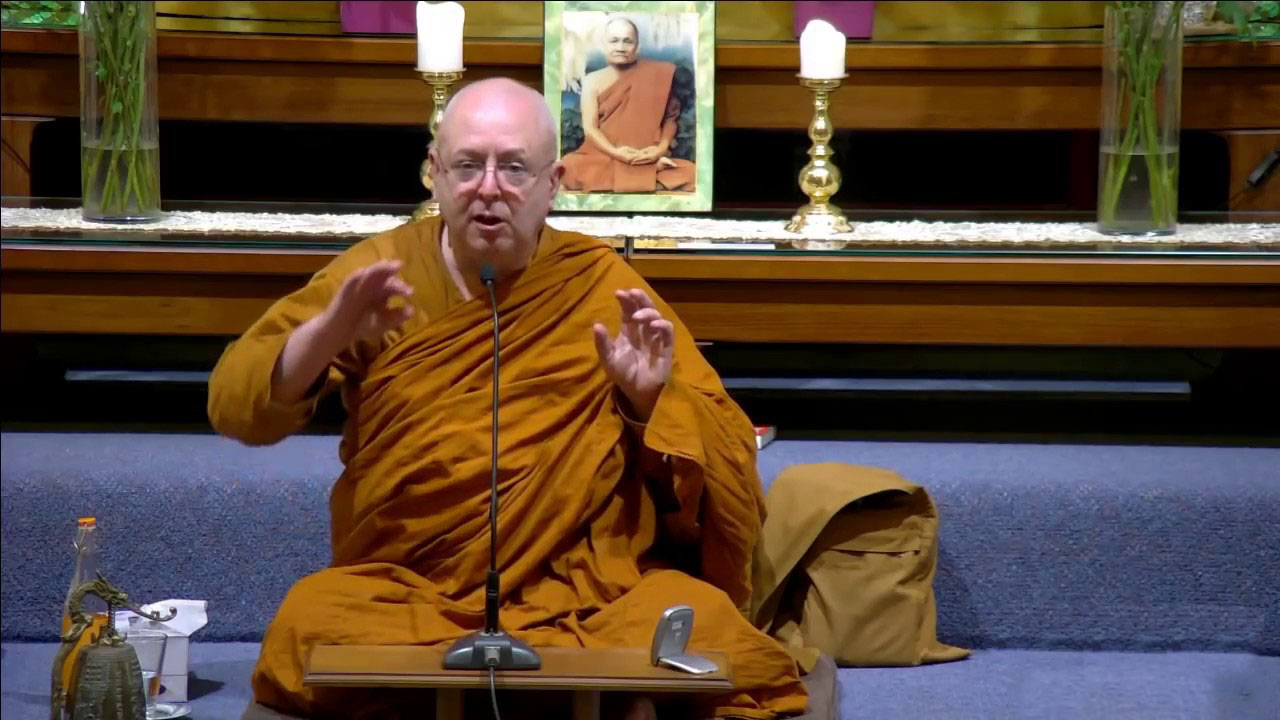The renowned British-Australian Buddhist teacher and Theravada monk Ajahn Brahm has shared a video message with the Buddhist sangha of Sri Lanka, calling for mindful restraint and kindness amid increasingly frantic mass protests as the island nation faces an escalating economic and political crisis.
“I have heard about the many difficulties that people in Sri Lanka from all walks of life are facing at this present time,” Ajahn Brahm said in a recorded message from Perth, Western Australia. “There are people who are going to meet together for peaceful protests: please make sure those protests are kept peaceful. That is your right, and it shows the people can unite together in peace—and peace is most important. So when you do walk together, please walk slowly, which creates a state of peace, and please don’t shout too many slogans, or [instead] have slogans of unity and peace.
“If it gets angry, then please just walk away and don’t continue in protest when they turn angry. People will try to make you angry, and then instead of being a very restrained, mindful, kind Sri Lankan, sometimes the mob takes over, and that anger just defeats the purpose.” (YouTube)
Sri Lanka is in the midst of its worst economic crisis in decades, characterized by record inflation, crippling power cuts, and severe shortages of fuel and food staples. Meanwhile, the Sri Lankan rupee has become the world’s worst-performing currency, dropping to a historic low earlier in April and even underperforming the Russian ruble. Furthering the crisis, foreign exchange reserves have been depleted by 70% over the last two years, leaving the country unable to import basic necessities such as food or fuel.
While ordinary Sri Lankans are forced to spend their days waiting for hours in lines in the hope of securing basic daily necessities, a senior politician has warned of the imminent threat of starvation for the South Asian nation’s population of 22 million people, noting that the current turmoil is “just the beginning.” (The Guardian)
Sri Lankans, outraged by the economic mismanagement of successive governments, have taken to the streets repeatedly in mass protests, in defiance of a curfew order and a state of emergency declared by President Gotabaya Rajapaksa. The people are demanding that Rajapaksa resign and transfer control of their country away from his family, who have ruled Sri Lanka for several decades, to more qualified public servants.
“Remember that Sri Lanka was always a peaceful country, it’s been a peaceful country; that’s been its strength for so many years,” Ajahn Brahm continued, in his appeal. “Yes, you can go to demonstrate, in the sense that you just walk, slowly, peacefully, in order to convey how you feel. But don’t let that feeling turn into anger. It is when it turns into anger that everything starts to fall apart.” (YouTube)
Ajahn Brahmavamso Mahathera, better known as Ajahn Brahm, was born to a working class family in London in 1951 and went on to study theoretical physics at Cambridge University. While at Cambridge, he joined the university’s Buddhist Society and at the age of 18, he saw a Buddhist monk for the first time. A year after he graduated from Cambridge he traveled to Thailand, where he was ordained as a monk in 1974 and studied under the famed meditation master of the Thai forest tradition Ajahn Chah. In the 1980s, Ajahn Brahm relocated to Australia, where he has served in a series of senior monastic roles. A prolific Dharma teacher and the author of three book, Ajahn Brahm is the present abbot of Bodhinyana Monastery in Western Australia.
In 2004, Ajahn Brahm was awarded the John Curtin Medal by Curtin University for his services to the Australian community. In 2006, the king of Thailand conferred the title “Tan Chao Khun” upon Ajahn Brahm, which can be compared to that of a bishop in the Christian tradition. In 2019, Ajahn Brahm was appointed a Member of the Order of Australia for services to Buddhism and gender equality.
In his message to Sri Lankan Buddhists, Ajahn Brahm continued: “One of my favorite poems, which I learned as a student, was a little passage from William Blake, who said:
Anger to the tyrant fled
And caught the tyrant in his bed
And slew the wicked tyrant’s head
And became a tyrant in his stead!
“That’s what happens when you think that it’s justified to be angry or to be violent. Anger never solved any problem. Violence, as you know, just leads to more violence. Peace is fine. And always that whatever difficulties Sri Lanka faces right now, it will pass. You’ve been through difficulties before, and they have passed. But keep the Dhamma, the peace, the kindness in your heart. . . .
“Kindness is more important and more powerful than violence. These are the Buddhist teachings. And so, don’t fight people you have to live with. Learn to be kind to them and express that you’re hurting, and then find a solution together.” (YouTube)
Buddhism is the state religion of Sri Lanka, which gained independence from British rule in 1948, with 70.2 per cent of the population identifying as Theravada Buddhists, according to census data for 2012. Hindus made up 12.6 per cent of Sri Lankans, while Muslims accounted for 9.7 per cent, Christians 7.4 per cent, and others 0.05 per cent. As the state religion, Buddhism receives special privileges under the constitution, although the constitution also stipulates freedom of religion and right to equality for all citizens.
